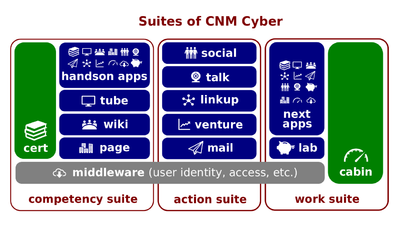Difference between revisions of "Federated vs Local Roles"
(→Script) |
|||
| (22 intermediate revisions by 2 users not shown) | |||
| Line 1: | Line 1: | ||
| − | [[File:Cnm-digital.png|400px|thumb|right|[[ | + | [[File:Cnm-digital.png|400px|thumb|right|[[CNMCyber suite]]s]][[Federated vs Local Roles]] (hereinafter, the ''Lectio'') is the [[lectio|lesson part]] of the '''[[Middleware Essentials]]''' [[lesson]] that introduces its participants to [[CNM Cabin]]. This ''lesson'' belongs to the [[Introduction to CNM Cloud]] session of [[EmployableU Concepts]]. |
| Line 5: | Line 5: | ||
The predecessor [[lectio]] is [[System-User Roles]]. | The predecessor [[lectio]] is [[System-User Roles]]. | ||
| − | === | + | ===Script=== |
| − | : | + | :It is worth mentioning that [[WorldOpp Middleware]] manages its own [[system-user role]]s and every other service of [[CNMCyber]] uses that role to allow that user to access its resources. [[WorldOpp Middleware]]'s [[system-user role]]s are called ''federated.'' |
| − | : | + | |
| + | :Going further, every service is supported by their own systems and those systems can manage their own [[local-system role]]s. For instance, if [[WorldOpp Middleware]] identifies you and informs [[CNMCyber.com]] that your [[federated-systems role]] is [[CertUser]], [[CNMCyber.com]] checks its own database and clarify that you joined some communities and, possibly, assigns its local role. If the system's database assigns no local role, then the particular service takes your ''federated'' role by default. | ||
| − | + | :Nevertheless, throughout all services of [[CNMCyber]], only [[WorldOpp Middleware]] can identify you as you. No other service or system can do that; they rely on [[WorldOpp Middleware]]'s determination. | |
| − | : | ||
| − | : | + | ===Key terms=== |
| + | :[[Federated-systems role]], [[local-system role]] | ||
===Closing=== | ===Closing=== | ||
| − | : | + | :Would you be interested in exploring more about [[system-user role]]s in [[CNMCyber]]?---Yes/No/I'm not sure |
| + | |||
'''[[CNM Apps]]''' is the successor [[lectio]]. | '''[[CNM Apps]]''' is the successor [[lectio]]. | ||
Latest revision as of 16:19, 13 April 2024
Federated vs Local Roles (hereinafter, the Lectio) is the lesson part of the Middleware Essentials lesson that introduces its participants to CNM Cabin. This lesson belongs to the Introduction to CNM Cloud session of EmployableU Concepts.
Content
The predecessor lectio is System-User Roles.
Script
- It is worth mentioning that WorldOpp Middleware manages its own system-user roles and every other service of CNMCyber uses that role to allow that user to access its resources. WorldOpp Middleware's system-user roles are called federated.
- Going further, every service is supported by their own systems and those systems can manage their own local-system roles. For instance, if WorldOpp Middleware identifies you and informs CNMCyber.com that your federated-systems role is CertUser, CNMCyber.com checks its own database and clarify that you joined some communities and, possibly, assigns its local role. If the system's database assigns no local role, then the particular service takes your federated role by default.
- Nevertheless, throughout all services of CNMCyber, only WorldOpp Middleware can identify you as you. No other service or system can do that; they rely on WorldOpp Middleware's determination.
Key terms
Closing
- Would you be interested in exploring more about system-user roles in CNMCyber?---Yes/No/I'm not sure
CNM Apps is the successor lectio.
